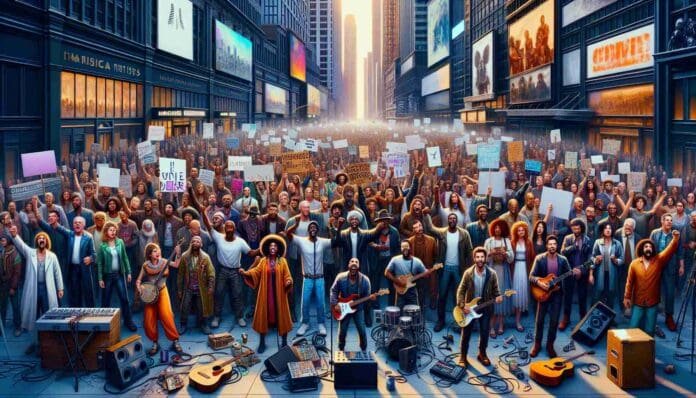Two hundred artists penned an open letter urging tech businesses and developers not to use Artificial music-generating capabilities that would discourage human innovation. Billie Eilish, the Bob Marley estate, Chappell Roan, Elvis Costello, Greta Van Fleet, Imagine Dragons, Jon Bon Jovi, the Jonas Brothers, Kacey Musgraves, Katy Perry, Mac DeMarco, Miranda Lambert, Mumford & Sons, Nicki Minaj, Noah Kahan, Pearl Jam, Sheryl Crow, and Zayn Malik are just a few of the talented and diverse artists on the artists as mentioned earlier list that might be considered for an incredible Coachella selection.
The letter states that artificial intelligence raises serious risks affecting our ability to safeguard our data, confidentiality, soundtracks, and means of living when applied carelessly. Some of the largest and most influential corporations are exploiting our research to educate artificial intelligence models without our consent. It could be disastrous for many struggling musicians, artists, and composers merely attempting to meet their finances.
These creators are correct. Artificial intelligence models that create innovative music, visual art, and writing pieces are trained on enormous datasets of previously created content; therefore, requesting that your work be excluded from the models is typically pointless. It is simply not possible that one of these musicians would try to stop others from copying their songs. Influencing deepfakes of well-known musicians is already achievable, and technology will only go further.
Some businesses, such as Adobe and Stability AI, are developing artificial song-generating tools that use either licensed or royalty-free music. However, even these instruments might have unfavorable effects on musicians who compose music for TV spots or other rhythms that musicians may purchase for their projects.

With technology becoming increasingly advanced, musicians usually got an unrefined treatment. Initially, file-sharing made it simple to obtain content completely free; streaming appeared as a solution, but it has yet to please musicians. The Union of Musicians and Allied Workers (UMAW) artists believe that Spotify’s typical subscription royalty rate is approximately $0.0038, or roughly one-fourth of a cent. The association has spent years fighting to get fairer streaming royalties for artists. Therefore, it seems logical that musicians must still be more confident about this new technology.

Additionally, writers have spoken out against the development of generative Intelligence. James Patterson, Michael Chabon, Suzanne Collins, Roxane Gay, and other authors were among almost 15 thousand writers who signed an identical letter of support to the Executives of OpenAI, Alphabet, Meta, Stability AI, IBM, and Microsoft in July.
These inventions replicate and duplicate human concepts, speech, narratives, and styles. The authors’ letter states that the “food” for AI systems is a billion copyrighted articles, books, writings, and poems—endless feeds to which there was never any law.
These tech firms, however, do not pay attention. You can still ask ChatGPT to generate a section in Margaret Atwood’s style; while it might not be perfect, it shows that the massive language model has read “The Handmaid’s Tale” and can produce a weakened version. Furthermore, legal action is now rather pointless because the copyright system is not often sufficiently intelligent to handle generative artificial Intelligence.
The musicians’ letter demands an end to this attack on human creation. We have to defend against the sneaky use of AI to take down the ecological system of music and trample against the legal rights of makers to mimic the sounds and resemblance of professional musicians.





